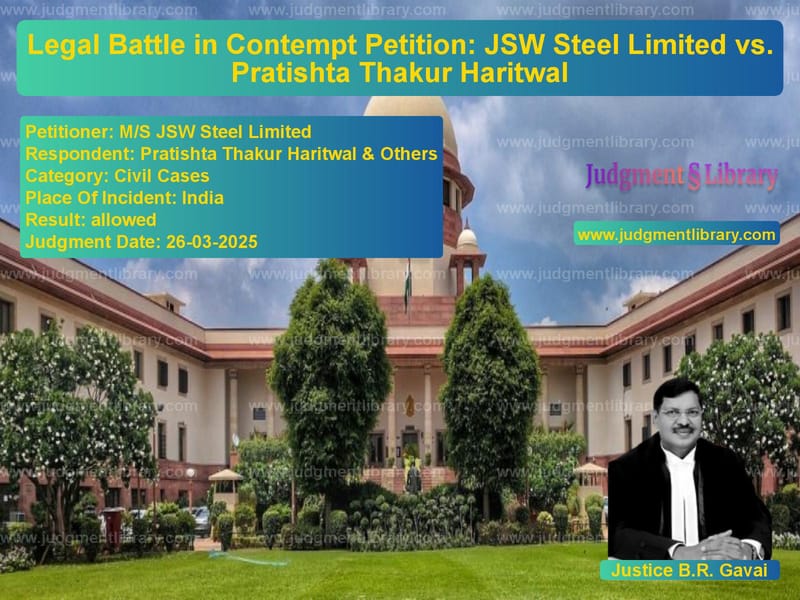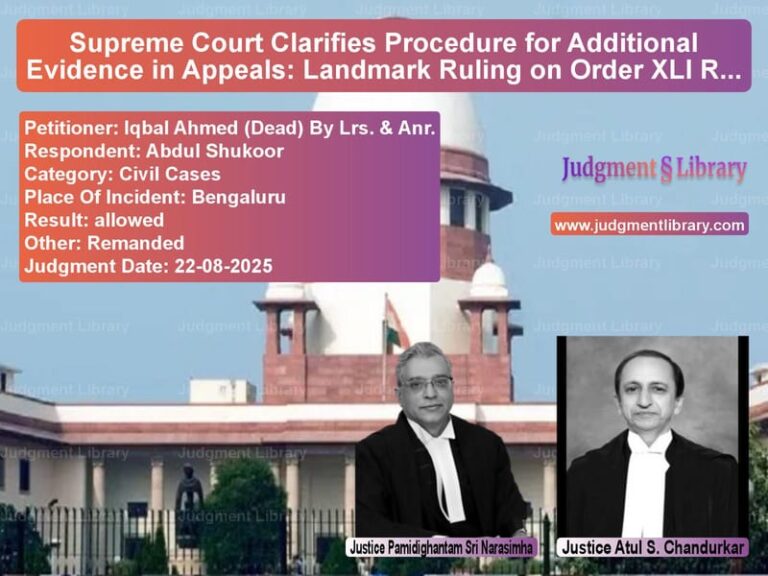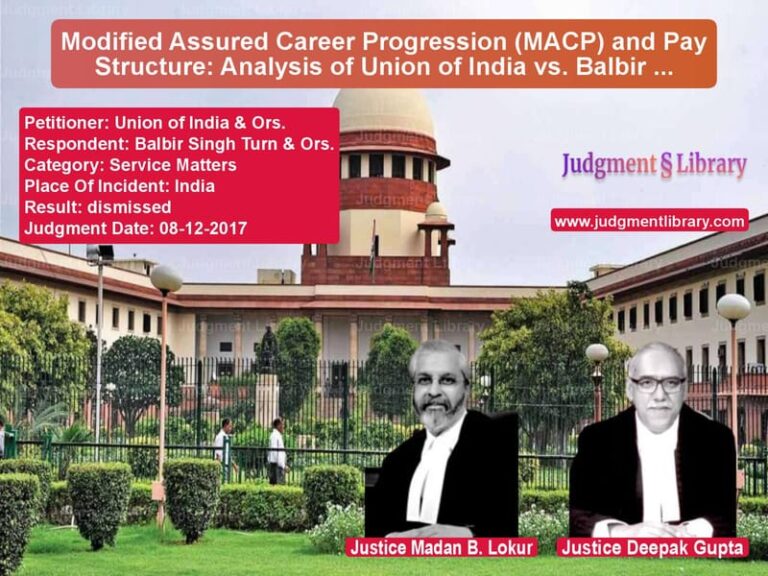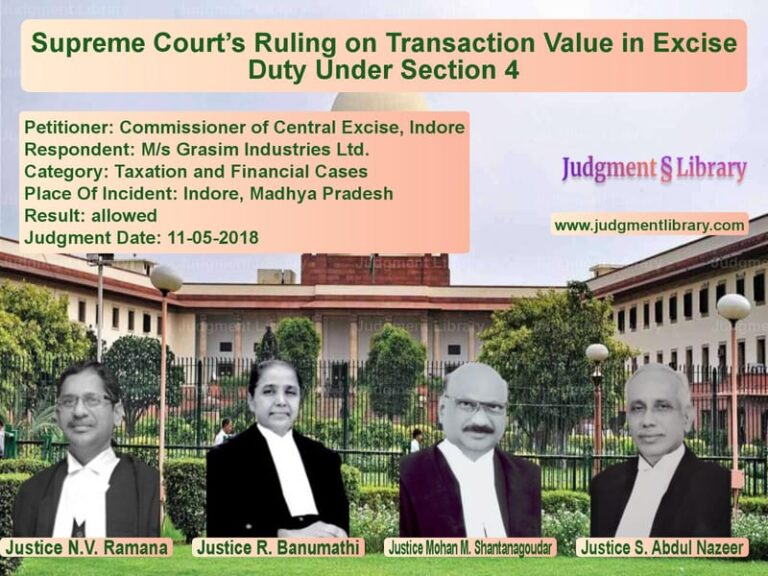Legal Battle in Contempt Petition: JSW Steel Limited vs. Pratishta Thakur Haritwal
The Supreme Court recently delivered a crucial ruling in the case of M/S JSW Steel Limited vs. Pratishta Thakur Haritwal & Others, addressing a contempt petition regarding non-compliance with a prior court order. This case sheds light on the significance of adhering to judicial mandates and the legal consequences of failing to comply with the Supreme Court’s directives.
The case arose when M/S JSW Steel Limited filed a contempt petition under Article 129 read with Article 142 of the Indian Constitution and Section 2(b) of the Contempt of Courts Act, 1971. The primary allegation was that the respondents had willfully disobeyed an earlier judgment issued by the Supreme Court.
Background of the Case
The matter dates back to a previous ruling on 13th April 2021, wherein the Supreme Court had provided specific directives to be followed by the respondent. However, the petitioner contended that these orders were blatantly ignored, leading to financial losses and procedural complications.
Petitioner’s Claims and Arguments
The legal counsel for M/S JSW Steel Limited presented a series of arguments, emphasizing the deliberate non-compliance by the respondents. The main points of the petitioner’s submission included:
- “The respondents have knowingly and willfully failed to adhere to the judgment passed by this Hon’ble Court, despite being given multiple opportunities to do so.”
- “The non-compliance is not an oversight or an administrative delay but a calculated effort to undermine the authority of the Supreme Court.”
- “Our client has suffered significant financial and operational hardships due to the respondents’ refusal to implement the directives.”
- “In light of the continued non-compliance, this court must take strict action to uphold the rule of law and ensure that its judgments are executed in letter and spirit.”
Respondents’ Defense and Counterarguments
The respondents, in their defense, denied any intentional disobedience of the court’s order. Their legal representatives argued:
- “The delay in execution was due to unforeseen administrative hurdles and should not be construed as contempt.”
- “We have taken significant steps toward compliance, but certain procedural formalities require additional time.”
- “The petitioner’s allegations are exaggerated and fail to account for the practical difficulties involved in executing the court’s ruling.”
- “We sincerely regret any inconvenience caused to the petitioner and remain committed to fulfilling the court’s directives in due course.”
Court’s Observations and Judgment
After considering both sides, the Supreme Court made the following key observations:
“It is evident that the respondents had ample time to comply with the court’s order, yet they chose not to do so. Such defiance not only undermines the authority of the court but also erodes the confidence of litigants in the judicial process.”
“Judicial orders are not mere suggestions; they are binding mandates that must be followed without delay. Any deviation, unless justified by extraordinary circumstances, constitutes contempt of court.”
In light of these findings, the court ruled in favor of M/S JSW Steel Limited and declared the petition as allowed. The bench also issued further directives to ensure compliance within a stipulated timeframe.
Legal Implications of the Judgment
This judgment sets a significant precedent for future cases involving non-compliance with Supreme Court rulings. It reaffirms the authority of the judiciary and underscores the necessity of obeying court orders.
The ruling serves as a warning to individuals and entities that judicial directives must be taken seriously. Failure to comply can result in legal consequences, including contempt proceedings.
Conclusion
The Supreme Court’s verdict in M/S JSW Steel Limited vs. Pratishta Thakur Haritwal & Others highlights the importance of upholding judicial integrity and ensuring that court orders are implemented in their entirety. The ruling serves as a benchmark for similar cases in the future and reinforces the principle that no entity is above the law.
Read also: https://judgmentlibrary.com/legal-battle-over-assigned-land-supreme-court-ruling-explained/
Petitioner Name: M/S JSW Steel Limited.Respondent Name: Pratishta Thakur Haritwal & Others.Judgment By: Justice B.R. Gavai.Place Of Incident: India.Judgment Date: 26-03-2025.
Don’t miss out on the full details! Download the complete judgment in PDF format below and gain valuable insights instantly!
Download Judgment: ms-jsw-steel-limite-vs-pratishta-thakur-har-supreme-court-of-india-judgment-dated-26-03-2025.pdf
Directly Download Judgment: Directly download this Judgment
See all petitions in Contempt Of Court cases
See all petitions in Judgment by B R Gavai
See all petitions in allowed
See all petitions in supreme court of India judgments March 2025
See all petitions in 2025 judgments
See all posts in Civil Cases Category
See all allowed petitions in Civil Cases Category
See all Dismissed petitions in Civil Cases Category
See all partially allowed petitions in Civil Cases Category







